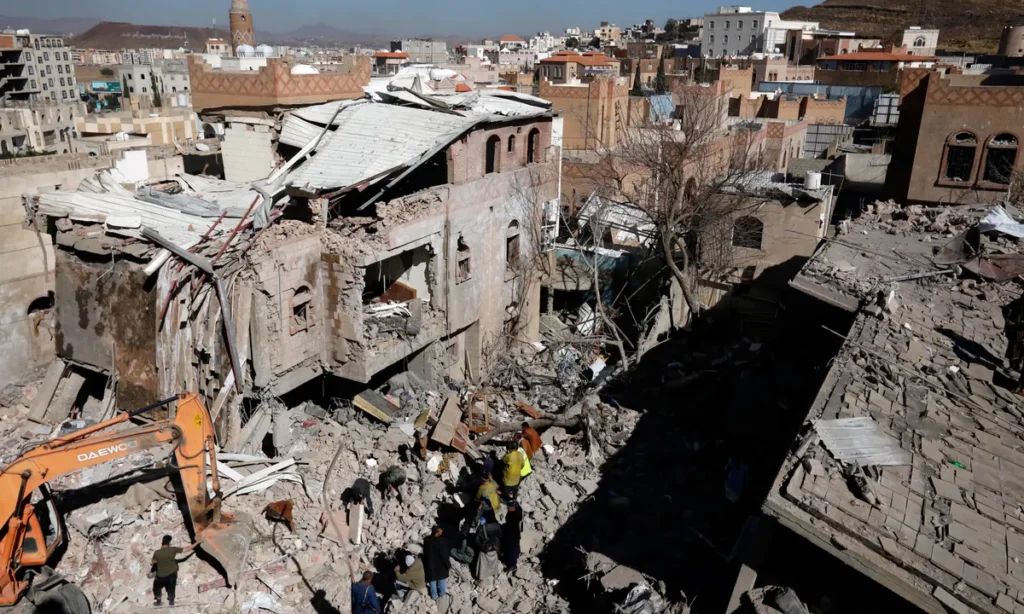The United States and Britain launched a second round of joint military strikes against Yemen’s Houthi rebels on Tuesday, responding to the rebels’ attacks on shipping in the Red Sea. The Iran-backed rebels have pledged to retaliate, raising concerns about a broader conflict directly involving Iran. Residents in the rebel-held capital Sanaa reported hearing the latest raids around midnight, targeting eight Houthi locations, according to a joint US-UK statement. In response, the Houthi rebels claimed 18 strikes across their territory. This comes after the US and British forces conducted an initial wave of strikes against the Houthi group earlier this month, with the US launching further air raids against missiles deemed as imminent threats to both civilian and military vessels.
The Houthi rebels have persisted in their attacks on shipping, contributing to a growing crisis in the Middle East that is linked to the Israel-Hamas conflict. Fears of a broader war, potentially involving Iran, have heightened tensions in the region. The recent US-UK strikes targeted “eight Houthi targets in Yemen in response to the Huthis’ continued attacks against international and commercial shipping as well as naval vessels transiting the Red Sea,” as stated in a joint statement. The precision strikes aimed to disrupt and degrade the Houthi capabilities threatening global trade and maritime safety.
The US Central Command provided details on the targets, stating that the strikes included missile systems and launchers, air defense systems, radars, and deeply buried weapons storage facilities. British Foreign Secretary David Cameron emphasized that the Houthi attacks on shipping had exceeded 12 incidents since the first round of joint strikes on January 11. Cameron stated, “What we have done again is send the clearest possible message that we will continue to degrade their ability to carry out these attacks and that we back our words and our warnings with action.”
Despite the joint military action, the Houthi rebels remain defiant. The Houthi military spokesman, Yahya Saree, vowed a response, stating, “These attacks will not go unanswered and unpunished.” Saree listed 18 strikes in various provinces, including Sanaa, Hodeida, Taez, and Al-Bayda. Iranian Foreign Minister Hossein Amir-Abdollahian warned that the US-UK joint action is a “strategic mistake” and a threat to peace and security in the region. He conveyed a message to British Foreign Secretary Cameron during the World Economic Forum in Davos, emphasizing the potential consequences of the intensified conflict.
A senior US military official provided insights into the strikes, explaining that a combination of precision-guided munitions from US and British aircraft, along with Tomahawk cruise missiles, were used. The official assured that there were no concerns about civilian casualties at the targeted sites, and the specific targeting aimed at disrupting Houthi capabilities threatening maritime vessels in the Red Sea, Bab al-Mandab, and the Gulf of Aden.
On Monday, just before the joint military operation, the Houthi rebels claimed to have fired on a US military cargo ship off the coast of Yemen. However, the claim was promptly denied by a US defense official. The Houthi rebels initiated attacks on Red Sea shipping in November, justifying their actions by asserting that they targeted Israeli-linked vessels in support of Palestinians in Gaza. The Houthi rebels have expanded their declared targets to include US and British interests as legitimate targets.
Beyond military action, the United States is employing diplomatic and financial pressure on the Houthi rebels. Last week, the US officially redesignated them as a “terrorist” organization, reversing the decision made soon after President Joe Biden took office. This move reflects an effort to apply additional pressure on the rebels through non-military means.
The Houthi rebels, in response to the joint strikes, reiterated their commitment to “respond to any attack” on Yemen. They also expressed their intent to continue preventing Israeli ships from passing through the Gulf of Aden and the Red Sea until the end of the conflict in Gaza. The ongoing Israel-Hamas conflict, sparked by an unprecedented October attack by the Palestinian militant group, has led to a cycle of violence resulting in significant casualties on both sides.
Israel responded with a relentless air and ground offensive that has caused numerous deaths, particularly among civilians in Gaza. The conflict has triggered regional unrest and violence involving Iran-backed groups in Lebanon, Iraq, Syria, and now Yemen. The US and UK joint military strikes against the Houthi rebels represent an escalation in response to their continued attacks on shipping, but the situation remains complex, with potential ramifications for regional stability and peace.
